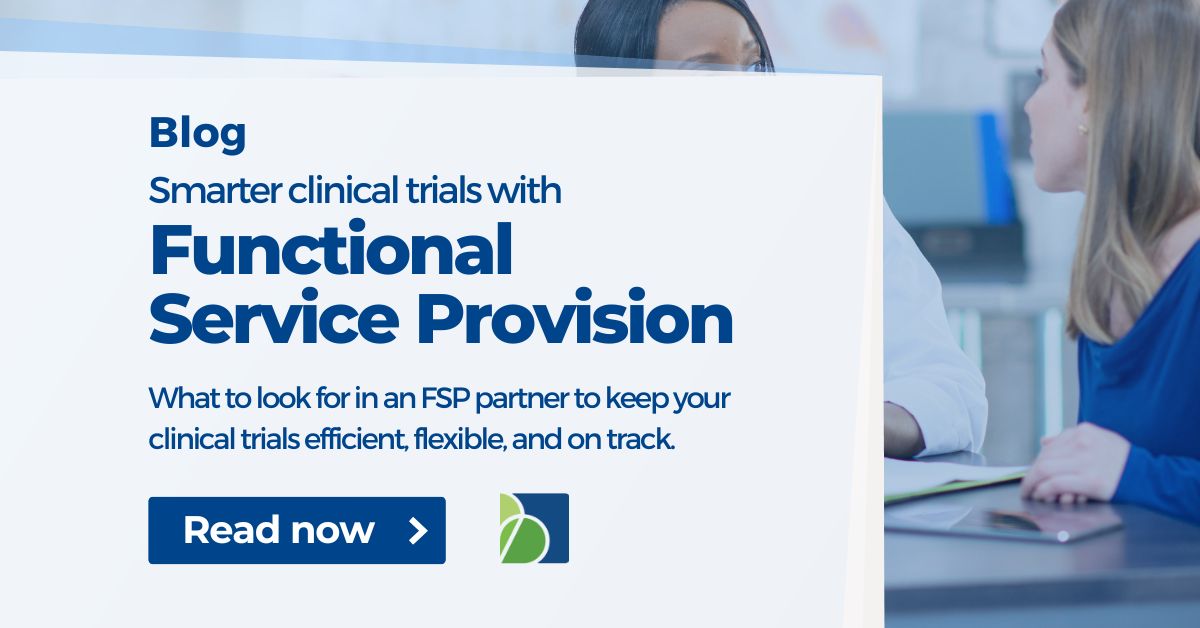For biotech and pharmaceutical companies, the challenge isn’t just innovation but execution too. Functional Service Provision (FSP) enables organizations to optimize clinical trials without the bottlenecks of traditional outsourcing. As competition intensifies and regulatory landscapes shift, companies need a model that balances flexibility, compliance, and speed while maintaining operational control.
With global trials growing more complex, companies must also manage evolving regulations, patient recruitment challenges, and multi-regional trial execution, all while maintaining quality and efficiency. FSP offers a dynamic framework that adapts to these demands, ensuring companies remain competitive in an industry where precision and agility define success.
This article explores how FSP is changing clinical trial operations and why it has become a key strategy for navigating an increasingly complex environment.
Read more about the advantages of FSP, including risk mitigation and operational efficiency.
What is FSP?
FSP is a strategic approach to clinical trial execution, outsourcing specific functions like monitoring, data management, and patient recruitment while keeping full oversight. Unlike full-service outsourcing, which shifts responsibility to a CRO, FSP allows companies to retain oversight while using specialized expertise where it’s needed most.
FSP’s solutions integrate with internal processes. his adaptability helps address specific challenges, such as regulatory compliance and site activation delays. Moreover, FSP partners contribute specialized expertise, ensuring that critical functions are managed effectively and efficiently, even in highly regulated environments.
By implementing the FSP model, organizations are not simply outsourcing tasks; rather, they are enhancing their operational strategies. This model facilitates navigation through complex regulatory environments, effective management of multi-regional trials, and expedited timelines for recruitment in niche markets. It equips organizations with the agility necessary to succeed in an industry where both time and accuracy are of great importance.
How FSP Streamlines Clinical Trial Operations
Delays in clinical trials don’t just affect timelines—they impact revenue, competitive positioning, and regulatory approval. FSP minimizes these risks by ensuring clinical trial operations remain streamlined, adaptive, and fully compliant. More than just an outsourcing model, FSP is a strategic enabler that optimizes efficiency at every stage. Companies can streamline workflows, reduce administrative burdens, and maintain a sharper focus on delivering therapeutic innovations.
FSP enhances operational efficiency by offering targeted support where it’s needed most. For example, instead of overwhelming in-house teams with complex, resource-heavy functions like data management or patient monitoring, an FSP model delegates these tasks to specialized providers. This ensures that these critical functions are precisely executed while freeing internal resources to focus on higher-value strategic initiatives.
What distinguishes it is its inherent flexibility. As clinical trials progress, the associated demands evolve, influenced by factors such as regulatory changes, recruitment challenges, and the necessity for enhanced site support across diverse regions. Utilizing FSP enables organizations to efficiently scale resources both upward and downward without the inefficiencies associated with traditional full-service models. Whether overseeing a global Phase III clinical trial or investigating niche markets, this flexibility ensures that operations remain streamlined and responsive.
From minimizing bottlenecks in site activation to accelerating data collection for interim analyses, FSP providers bring expertise and focus that directly impact the trial’s success. More importantly, they ensure the organization remains compliant, efficient, and agile, empowering you to stay ahead in an increasingly competitive landscape.
Flexibility for Multi-Regional Clinical Trials
Expanding into new markets adds complexity, but also opportunity. FSP ensures global reach without regulatory setbacks, keeping trials on schedule and within budget.
FSP’s strength lies in its adaptability. For example, multi-regional trials often require tailored approaches to address region-specific regulations, cultural differences in patient engagement, and variable timelines for site activations. An FSP model ensures these factors are managed seamlessly, with localized expertise that aligns with broader operational goals.
Whether tackling the unique regulatory landscapes of the CEE and CIS regions or expanding into new markets, the trial remains on track. A strong geographical footprint is one of the most important features of successful FSP models.
Discover how FSP models provide extensive geographical coverage to streamline multi-regional trials.
Instead of applying a one-size-fits-all outsourcing model, FSP adapts trial strategies to regional needs, allowing companies to expand efficiently without disrupting operations. This means a leaner, more responsive operation that reduces costs while maintaining full control over trial execution.
The Importance of Site Startup Services in Clinical Trials
For any clinical trial, the site startup phase is where success begins—or where delays initially accumulate. This stage, involving everything from regulatory approvals to site activation, demands precision and expertise. FSP simplifies this process by providing the localized support needed to overcome challenges, ensuring the trial gets off the ground quickly and efficiently.
Site startup is particularly complex in multi-regional trials, where varying regulatory requirements, local customs, and logistical hurdles can slow progress. FSP providers bring deep regional knowledge and established networks, streamlining site selection, contracts, and ethics committee approvals. It ensures a smoother path to activation for both entering the highly regulated EU market and navigating the diverse regulatory landscapes of the CEE and CIS regions.
The real value of FSP in site startup lies in its ability to mitigate risks and avoid costly delays. By using specialized expertise and scalable resources it can accelerate timelines without sacrificing quality or compliance. It doesn’t just manage the site startup process—it optimizes it, ensuring the trial is positioned for success from day one.
Enhancing Patient Recruitment Through FSP
Patient recruitment is one of the most critical, and challenging phases. Missed recruitment targets can lead to costly delays and threaten the success of the entire study. FSP provides the strategic support needed to overcome these obstacles, offering solutions to identify, engage, and enroll patients efficiently, even in niche markets.
Recruiting patients in highly competitive or underserved regions requires more than a traditional outreach. FSP partners use data-driven tools and local expertise to identify eligible participants and tailor recruitment strategies to regional needs. For example, in niche markets across the CEE and CIS regions, FSP teams use their understanding of local healthcare systems and patient behaviors to build trust and drive participation.
The advantage is clear: FSP doesn’t just improve recruitment metrics—it ensures the study progresses on schedule without compromising patient diversity or data quality. By combining scalable resources with technology-driven solutions like decentralized clinical trial management, FSP helps you reach patients where they are, facilitating the recruitment process from start to finish.
Outsourcing Clinical Trial Monitoring and Data Management
Any misstep in ensuring the accuracy of data and the quality of monitoring can jeopardize compliance, delay timelines, and inflate costs. FSP enables outsourcing these functions while maintaining full control and oversight.
Clinical trial monitoring and data management are resource-intensive processes, requiring careful attention to detail and advanced technological support. By outsourcing these functions through FSP it is possible to gain access to highly specialized teams equipped with the latest tools and methodologies. From real-time data monitoring to streamlined risk-based approaches, FSP partners ensure the trial runs smoothly and efficiently, without overburdening internal resources. The European Medicines Agency (EMA) and FDA now expect sponsors to adopt risk-based monitoring (RBM) strategies that prioritize real-time issue detection over-reactive audits.
Additionally, FSP providers integrate advanced data management platforms, AI-powered risk assessments, and centralized monitoring solutions to enhance compliance and streamline site oversight. By outsourcing these functions, sponsors gain access to specialized teams trained in global regulatory requirements, ensuring trials remain inspection-ready at all times.
The value of outsourcing through FSP lies in its dual benefit: maintaining the integrity of trial operations while reducing the administrative and financial burden on teams. In a competitive and highly regulated industry, FSP ensures you can focus on strategic decision-making while leaving the operational intricacies to the experts.
The Role of FSP in Biotech-Specific Challenges
Biotech companies operate in a high-stakes environment where agility, precision, and scalability define success. Unlike large pharma organizations with extensive in-house resources, mid-sized biotech firms often face constraints in clinical trial execution—limited budgets, lean teams, and the need to pivot quickly in response to new data or regulatory changes. FSP is designed to bridge these gaps, providing biotech companies access to specialized expertise and scalable support without the overhead of full-service outsourcing.
FSP can provide tailored, on-demand solutions that align with the company’s growth trajectory. Whether it’s deploying experienced clinical monitors, managing multi-regional site activations, or ensuring compliance with evolving regulatory landscapes, it enables biotech firms to maintain control while using external expertise. This approach not only enhances operational efficiency but also mitigates risks that could derail trial progress.
A biotech company advancing from early-stage trials to late-phase studies must rapidly expand its operational capacity. FSP allows seamless scaling, providing additional resources when needed and reducing overhead when demand shifts. This ensures biotech firms can focus on innovation and clinical progress without being weighed down by logistical challenges.
Future Trends in FSP and Clinical Trials
How can a clinical trial strategy stay ahead of the curve rather than simply keeping pace? Companies that integrate FSP early gain a first-mover advantage in an increasingly digital, decentralized, and competitive trial landscape. As the industry evolves, those slow to adapt face rising inefficiencies, compliance hurdles, and costly delays. FSP is no longer just about filling resource gaps, it’s about building agile, scalable trial operations ready for what’s next.
Decentralized clinical trials (DCTs) are becoming an industry standard, and companies using FSP to integrate digital patient engagement, remote monitoring, and AI-driven trial oversight are already accelerating trial timelines. This eventually allows sponsors to expand patient access, improve recruitment efficiency, and collect high-quality data in real time—all without the traditional site constraints.
Regulatory landscapes are also becoming more dynamic, particularly in regions like the EU and CEE/CIS. With shifting compliance requirements and increasing scrutiny from regulatory bodies, FSP offers an adaptive solution to ensure trials remain compliant without overburdening in-house teams. Using local expertise and regulatory intelligence, FSP providers can help sponsors anticipate and respond to changes before they impact timelines.
Finally, the future of FSP is also defined by data-driven decision-making. With AI-powered analytics, risk-based monitoring, and automated data management systems, FSP is evolving from an operational necessity into a strategic advantage. Companies that embrace this model will not only enhance efficiency but also gain deeper insights into trial performance, allowing for more agile and informed decision-making.
The future of clinical trials belongs to companies that adapt. FSP is no longer a cost-cutting tool—it’s a strategic framework for navigating digital transformation, decentralized trials, and evolving regulatory landscapes. Companies that integrate FSP into their clinical strategy today will not only optimize efficiency but also future-proof their operations against an increasingly complex industry. The choice isn’t just about outsourcing—it’s about staying ahead.
Learn more about Biomapas’ tailored FSP solutions and how they drive clinical trial success.












